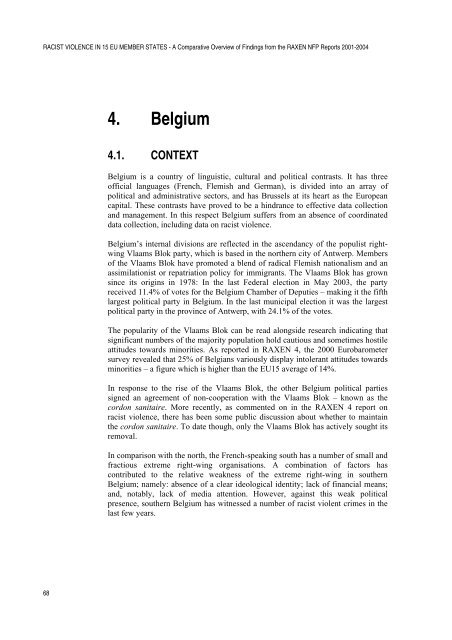RACIST VIOLENCE IN 15 EU MEMBER STATES - Cospe
RACIST VIOLENCE IN 15 EU MEMBER STATES - Cospe
RACIST VIOLENCE IN 15 EU MEMBER STATES - Cospe
Create successful ePaper yourself
Turn your PDF publications into a flip-book with our unique Google optimized e-Paper software.
<strong>RACIST</strong> <strong>VIOLENCE</strong> <strong>IN</strong> <strong>15</strong> <strong>EU</strong> <strong>MEMBER</strong> <strong>STATES</strong> - A Comparative Overview of Findings from the RAXEN NFP Reports 2001-2004<br />
4. Belgium<br />
4.1. CONTEXT<br />
Belgium is a country of linguistic, cultural and political contrasts. It has three<br />
official languages (French, Flemish and German), is divided into an array of<br />
political and administrative sectors, and has Brussels at its heart as the European<br />
capital. These contrasts have proved to be a hindrance to effective data collection<br />
and management. In this respect Belgium suffers from an absence of coordinated<br />
data collection, including data on racist violence.<br />
Belgium’s internal divisions are reflected in the ascendancy of the populist rightwing<br />
Vlaams Blok party, which is based in the northern city of Antwerp. Members<br />
of the Vlaams Blok have promoted a blend of radical Flemish nationalism and an<br />
assimilationist or repatriation policy for immigrants. The Vlaams Blok has grown<br />
since its origins in 1978: In the last Federal election in May 2003, the party<br />
received 11.4% of votes for the Belgium Chamber of Deputies – making it the fifth<br />
largest political party in Belgium. In the last municipal election it was the largest<br />
political party in the province of Antwerp, with 24.1% of the votes.<br />
The popularity of the Vlaams Blok can be read alongside research indicating that<br />
significant numbers of the majority population hold cautious and sometimes hostile<br />
attitudes towards minorities. As reported in RAXEN 4, the 2000 Eurobarometer<br />
survey revealed that 25% of Belgians variously display intolerant attitudes towards<br />
minorities – a figure which is higher than the <strong>EU</strong><strong>15</strong> average of 14%.<br />
In response to the rise of the Vlaams Blok, the other Belgium political parties<br />
signed an agreement of non-cooperation with the Vlaams Blok – known as the<br />
cordon sanitaire. More recently, as commented on in the RAXEN 4 report on<br />
racist violence, there has been some public discussion about whether to maintain<br />
the cordon sanitaire. To date though, only the Vlaams Blok has actively sought its<br />
removal.<br />
In comparison with the north, the French-speaking south has a number of small and<br />
fractious extreme right-wing organisations. A combination of factors has<br />
contributed to the relative weakness of the extreme right-wing in southern<br />
Belgium; namely: absence of a clear ideological identity; lack of financial means;<br />
and, notably, lack of media attention. However, against this weak political<br />
presence, southern Belgium has witnessed a number of racist violent crimes in the<br />
last few years.<br />
68
















